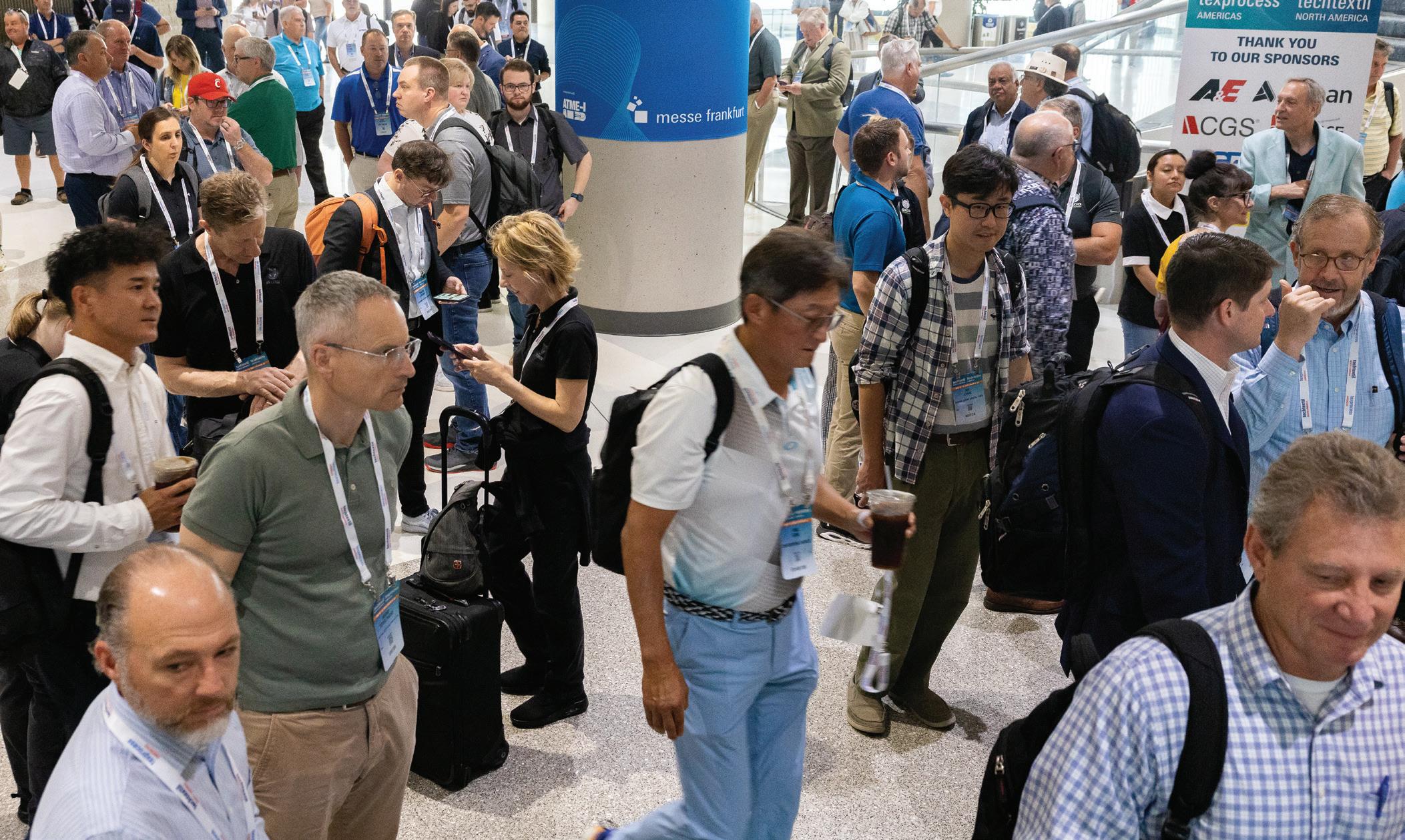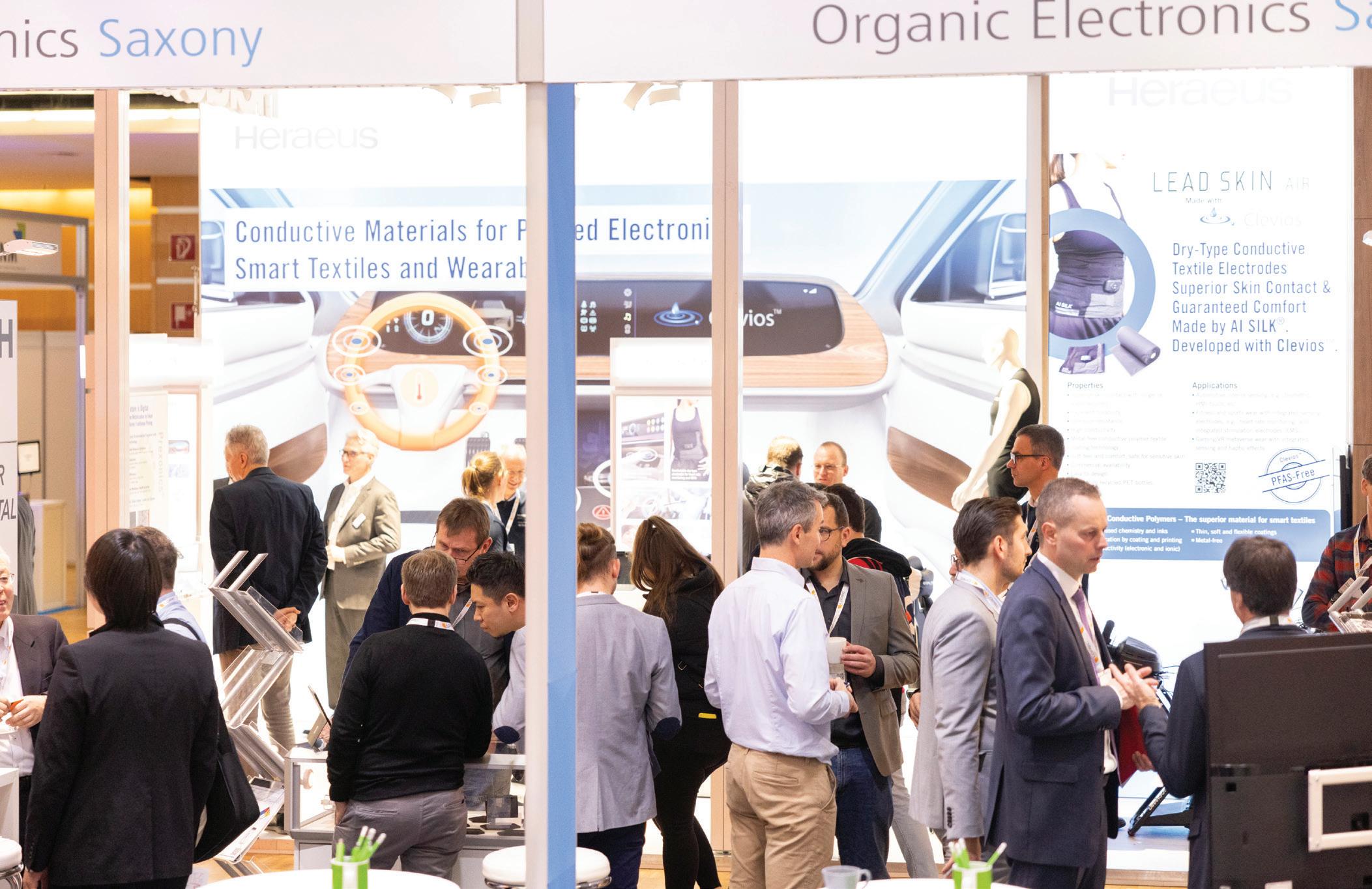
4 minute read
NOTES TECH
Eastman and Debrand to Collaborate on Apparel Solutions
Eastman, a specialty materials company and producer of Naia™ cellulosic fibers, has formed a strategic collaboration with Debrand, a prominent, nextlife logistics company specializing in finding sustainable solutions to apparel waste for some of the world’s top apparel and footwear brands.
Teaming up with Debrand for collection of the waste, Eastman is using its cutting-edge molecular recycling technology to recycle 5,000 pounds of preand post-consumer apparel waste. The process breaks down apparel waste to its molecular building blocks and uses the certified recycled material to create Naia™ Renew fibers – circular fibers made from 60% sustainably sourced wood pulp and 40% recycled waste material via Global Recycled Standard-certified mass balance.
Eastman and Debrand are showcasing the transformative potential of molecular recycling technology to address the textile waste crisis. By providing more circular solutions for apparel waste, this partnership sets a new standard for sustainable practices in the fashion industry. Prior to its collaboration with Eastman, Debrand secured a strategic investment from Waste Management, the leading provider of comprehensive waste management in North America, to deliver circular solutions across the U.S. and Canada. www.eastman.com
GTT Expands PFAS-Free Finishing to South Korea
U.S.-based textile treatment specialist Green Theme Technologies (GTT) is broadening its water and PFAS-free finishing platform into the South Korean market through a partnership with functional textile manufacturer, Hwasung International. Hwasung International will become the inaugural Korean mill to offer GTT’s advanced Empel brand of dry-finishing formulations.
These formulations have undergone rigorous testing and certification to ensure they are entirely free of PFOA and PFOS chemicals, commonly

Cone Denim Introduces COLOURizd™ Sustainable Color Technology
Cone Denim® launched COLOURizd sustainable alternative technology for denim at the Kingpins Show Amsterdam, in April. This technology, developed by COLOURizd LLC, allows for a wide range of colors and textures while minimizing processing steps, resulting in a more sustainable and efficient approach to textile coloration.
“Cone Denim is excited to launch this unique innovative color technology,” said Cone Denim Director of Innovation Caitlyn Holt. “Not only is this a first for Cone, but it is new to the industry. This technology will allow us to have a quantifiable impact with unprecedented natural resource savings per yard produced.”
COLOURizd’s revolutionary QuantumCOLOURTM technology transforms textile coloration by directly infusing pigments and a binder into the yarn fibers. This advanced process enhances the yarn with vibrant colors, can create visual texture, and also eliminates the need for traditional dye baths and lengthy wet processing. By doing so, it significantly reduces environmental impact, paving the way for a new era in sustainable fashion. It is bleach-safe and provides excellent shade matching and color consistency. www.conedenim.com known as PFASs, by Bureau Veritas. www.greenthemetech.com

The collaboration between Green Theme Technologies and Hwasung International is a milestone in promoting environmentally friendly textile treatments in South Korea. By introducing PFAS-free finishing solutions, both companies are contributing to the industry’s shift towards sustainable and safer manufacturing practices.

Asahi Kasei Collaborates on Development of Recycling Technology for Carbon Fiber
Asahi Kasei, a diversified Japanese multinational company, has developed a new technology for recycling carbon fiber plastic compounds together with the National Institute of Technology, Kitakyushu College and Tokyo University of Science.
Carbon fiber reinforced plastics (CFRP) are highly attractive for various industries in demanding application fields due to their unique balance of rigidity, mechanical strength and light weight – also compared with conventional glass fiber reinforced plastics. However, CFRPs are expensive and challenging from a recycling perspective, as it is difficult to extract the carbon fibers from the resin after usage.
Together with its project partners at the National Institute of Technology at Kitakyushu College and the Tokyo University of Science, Asahi Kasei developed a recycling method that allows carbon fibers to be extracted from CFRP or carbon fiber reinforced thermoplastics (CFRTP) used in automobiles. This results in high-quality, inexpensive continuous carbon fiber that can be recycled perpetually, contributing to circular economy. Unlike carbon fiber that is chopped up during the recycling process, Asahi Kasei’s method allows carbon fiber to be extracted from a plastic compound seamlessly, resulting in continuous strands of carbon fiber that can be reapplied in exactly the same manner while retaining properties identical to the original substance.
The conventional technologies for recycling carbon fibers by chopping and re-applying them results in a product with lower quality and less durability, insufficient for high-performance applications. To address this issue, Asahi Kasei has developed an “electrolyzed sulfuric acid solution method” that allows the carbon fiber to retain its original strength and continuous nature while fully decomposing the resin the carbon fiber is embedded in. This allows for its continued use in high-performance applications and presents an inexpensive, circular solution to the end-of-life dilemma of carbon fiber plastic compounds. www.asahi-kasei.com
CARBIOS, a pioneer in the development and industrialization of biological technologies to reinvent the life cycle of plastic and textiles, and Hündgen Entsorgungs GmbH & Co. KG, a waste management expert in logistics, sorting services and the recycling of recyclable materials from waste mixtures, announced a signing of a non-binding Memorandum of Understanding relating to the sourcing, preparation and recycling of 15kt/year of post-consumer PET waste using CARBIOS’ biorecycling technology at its first commercial plant in Longlaville, France, starting late 2026.
The partnership will leverage Hündgen’s expertise and network in the sourcing and preparation of light packaging waste collected from German households. This PET waste will be prepared into flakes ready
Technology gets EPA Approval for Antimicrobial Product
Fuze Technology recently announced the Environmental Protection Agency’s (EPA) registration and approval for its products used in textiles and surfaces for antimicrobial effects, as well as lifetime durability of its application.
“This is huge news for Fuze and for the textiles industry,” said Andrew Peterson, Fuze CTO. “The EPA has reviewed our product and verified that it is an antimicrobial that is retained by the fabric for more than 100 washes. That is a first in the industry.” www.fuze47.com for biorecycling using CARBIOS’ enzymatic depolymerization technology, which produces food-grade PTA and MEG, further re-polymerized into PET.
The EPA’s approvals uniquely position Fuze in the market, making Fuze the only antimicrobial that can last the life of the textile it is applied to. Fuze uses its patented process to create its products that are applied to fabrics using various application methods.
In addition to its antimicrobial features, Fuze’s technology leads with its chemical-free, anti-odor capabilities which also promote moisture wicking and significantly faster drying times, while not disrupting the fabrics look or feel.
The supply partnership with Hündgen contributes to securing the majority of CARBIOS’ feedstock needs for its first commercial plant in Longlaville, France. This plant will have a 50kt/year capacity when fully operational and is currently under construction. This latest sourcing announcement comes in addition to previously announced agreements, such as with Landbell Group for food trays from Germany, and the winning CITEO tender for trays in France. The location of the Longlaville plant is strategically close to nearby waste supplies in Belgium, Germany and Luxembourg. www.carbios.com










